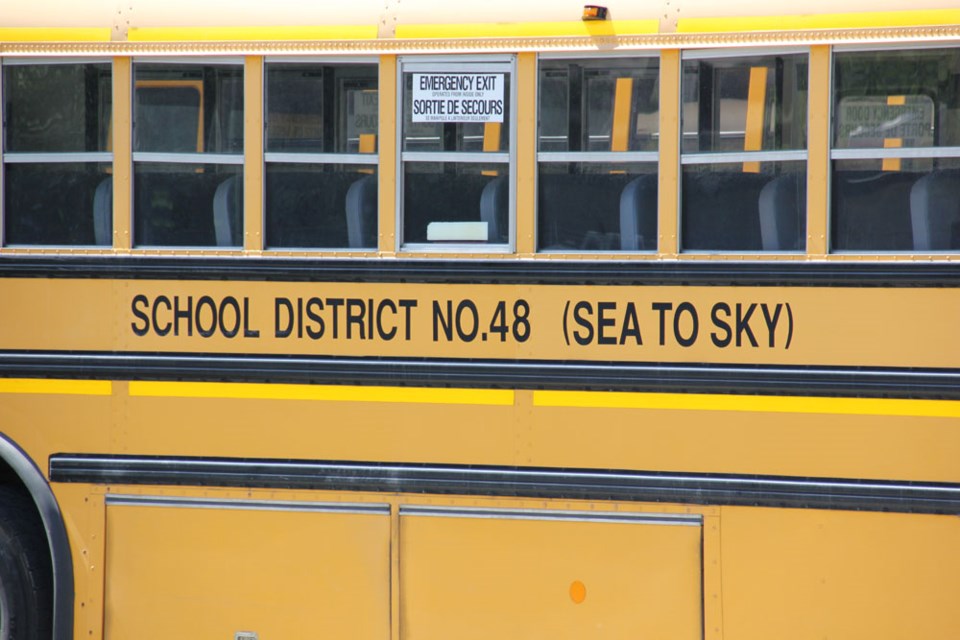As the Sea to Sky School District tallies the potential costs of running buses for a later start time for students, trustees discussed whether the idea is worth pursuing.
While the anticipated cost has decreased from an initial estimate of just under $458,500, the latest assessment of $389,241.86 has some trustees pressing pause on the idea.
"I'm not seeing a compelling case for taking it on as a huge project for the district and funding it," said board chair Rick Price after a presentation on the proposal.
That price would include Squamish, Pemberton and Whistler secondary schools starting late for 181 school days. While Whistler and Pemberton students could arrive at school on the buses for 10 a.m., the buses in Squamish would arrive at 9:30 a.m. Squamish's total was the lowest at $44,671, followed by Whistler at $54,141.17 and Pemberton's costs of $290,428.98.
Ian Currie, the district's director of operations, said the adjustment in cost comes from realizing they wouldn't have to have all buses double back on routes for elementary students and secondary students.
"We haven't had the experiences of running the buses to see what would actually happen in Squamish," Currie told the trustees at the Feb. 12 board meeting.
The lower price was a bit of a surprise, Currie said. The board would only have to add one extra driver for the area and the routes make it possible not to run every bus twice every day.
In Pemberton, the distance of travel makes it impossible for bus drivers to do double trips. The higher cost comes from needing to hire a second driver for the area — it doesn't include the cost of the two additional buses they would need in Pemberton.
"It's adding drivers, and it's kilometres and hours and time. So, it's a big number in Pemberton even though it's a small number of students relative to the rest of the district."
Currie said Whistler's pilot project has been a good example to see some savings over the trial period.
Using public transit
While the use of public transit has been floated as an option, especially since the Resort Municipality of Whistler will be providing free bus passes to school-age kids, Currie said that Whistler transit doesn't currently have the assets or time to accommodate high school bus rides. It would need to transport 350 students every day, not including their regular passengers.
"They're willing to shift their pick-up times for our bell schedule," Currie said.
For Whistler transit to acquire more drivers and buses to accommodate the local students, the earliest it could start would be in 2021.
Supt. Lisa McCullough said they could have the schools make the decision individually and pay the difference in transportation costs or partner with transit in their areas. In Pemberton, there is no public transportation.
Trustee for Area C, which includes Pemberton, Rebecca Barley said the late start times might not be the best use of resources.
"Pemberton and D'Arcy and Mount Currie and all the other outlying communities are always feeling a little bit like an afterthought. So, if this is something that they can never even approach in the foreseeable future, then that leaves a little bit of an issue with me," Barley said.
Pilot project
The pilot project at Whistler Secondary School has also been studying what kind of impact late start times could have on attendance and punctuality, by comparing attendance rates of late start dates to the same date the year before. Assistant Supt. Chris Nicholson, who presented the findings, said there wasn't much of a difference in attendance.
A difference they did notice was a significant reduction of late students — at least at the beginning of the pilot project — because students had more time to sleep in, Nicholson said. In later weeks, however, rates of student tardiness were similar or higher than the year before. The board will have more information at the end of the school year.
McCullough said there has been some research about late start times benefiting attendance, but added it's unclear how reliable the research is.
Trustees mentioned the thinking that a late start time could help with teenage students' sleep cycles, but Price said only implementing the late start time once a week or every once in a while would not benefit sleep cycles.
"Some of the sleep research shows the most important thing is consistent sleep hours," he said.
He went on to say the school district's role is to maximize learning.
"We certainly haven't, and I doubt that we could, collect any compelling evidence on whether it makes a difference to how effectively kids learn or how deeply they're engaged in their learning on a late start day compared to an early start day," Price said.
"It seems to me to be a weak case to make a big change that could also be costly."
Anecdotally, 80% of students and parents had a positive reaction to late start times. Teachers, however, were split 50% in favour and 50% not.
If the school board chose to pursue a late start time for every day of the school week, it would have to be put to public consultation.



